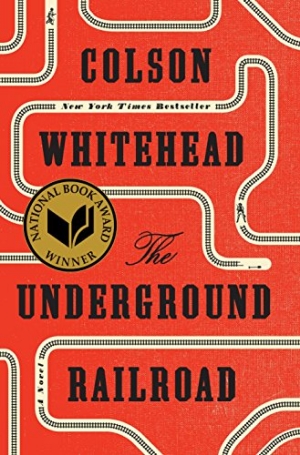Society’s conception of sin continues to evolve over time. Religious instruction we may have received as children might not match up with our conception of what’s thought sinful today. In addition, the categories of sin have expanded to include the institutional and the national, among others, in addition to the personal. And sin’s contextual setting is generally secular.
Despite this fluidity, two recent novels tackle subjects that qualify as sinful from almost anyone’s vantage point. The multiple-award-winning (National Book Award, Pulitzer Prize) novel The Underground Railroad by Colson Whitehead tackles America’s original sins of slavery and genocide (violence and theft perpetrated against Native Americans appears as a thread throughout the book). This year’s buzz-generating novel, My Absolute Darling by debut author Gabriel Tallent, is focused on the personal: child sexual abuse and incest. The two novels are quite different but both are intensely gripping reads.

Let’s begin with The Underground Railroad. Whitehead has done a number of extraordinary things with this book. First, he has done a phenomenal job of describing the experience of slavery and the pervasive, lasting damage it caused. The novel’s primary heroine, Cora, is completely believable in her fluctuating fear and courage, hesitation and anger. Cora is pinpointed within her biological (her grandmother Ajarry and her mother Mabel are nicely delineated) and geographical (Cora starts her journey on a vicious plantation in Georgia and travels the railroad from there) settings, so she seems very tangible and real, as do her antagonists. One of these, the “slave catcher” Ridgeway, reminds me of of the judge in Cormac McCarthy‘s Blood Meridian in his flamboyantly malevolent behavior and philosophizing. Among its other sterling qualities, The Underground Railroad is a real page-turner. It’s a hell of a story.
The story is even richer for its ingenious sci-fi twist: the underground railroad is a literal railroad, complete with tracks and actual trains traveling unseen through hidden tunnels laboriously carved out beneath the earth. The stations are hidden under the homes and barns of abolitionist sympathizers deep in the South. This literal railroad is handled with subtlety and actually seems quite believable in context. Its operators run enormous risks, and some of them pay dearly. The Underground Railroad presents a unique and unforgettable view of the horrors of slavery, and its lessons pack unfortunate relevance in today’s America. The fact that the novel is also a fabulous read only adds to its achievement.
The case for My Absolute Darling is not quite so convincing. It too is a stunning read, but in an entirely different and more claustrophobic way. It was published quite recently and hasn’t garnered any awards yet, but it has received extraordinarily extravagant, not to say hyperbolic, praise. Stephen King has already hailed the book as a “masterpiece”; this strikes me as a bit premature.

The core of the book concerns the struggles of 14-year-old “Turtle” Alveston to survive the depredations, sexual and otherwise, of her charismatic but dangerously out of control father, Martin. The Alvestons (Martin’s wife has already died under sketchy circumstances) live alone, in a remote setting nearly off the grid outside Mendocino. Martin is a survivalist as well, and browbeats his daughter on a regular basis to master the necessary skills. Between that and the incest, it’s small wonder that Turtle struggles in every way at school and is a conspicuous outcast.
It has to be acknowledged that the book is exceptionally well-written. Tallent’s mother Elizabeth (one of his two mothers; he was raised by lesbians) is a well-regarded writer in her own right, having published stories and essays in The New Yorker and many other publications. So writing runs in the family. And Gabriel was brought up in the area where the book is set, which contributes to its sense of authenticity. His writing on Northern California flora, and the distinctions to be drawn between various firearms, is incredibly detailed and adds another layer of verisimilitude. Furthermore, Tallent’s depiction of Jacob, a high school boy who starts to draw Turtle out and eventually draw her toward the outside world, is marvelously done. Jacob’s sophisticated banter and essential innocence ring completely true.
Yet there is an ugliness in the book that revolves around its subject matter. Tallent has stated, in interview after interview, that he wanted to handle the sexual abuse of a teenage girl by her father gingerly without any hint of exploitation. He probably does this as well as it can be done but the subject stands regardless and continues to radiate its own unhealthy attraction for the reader.
I want to give Gabriel Tallent the benefit of the doubt, simply because this book is so well written. But the book’s denouement gives me pause: it is written in such a sweeping cinematic style that it is as though the writer were simply transcribing the scene from the film that is sure to come. My Absolute Darling is going to transform Gabriel Tallent’s life and make him famous (well, as famous as a writer can be these days) and wealthy. Did he set out to achieve this? You might reply that the book is so masterfully done it doesn’t really matter. But if Tallent chose to depict Turtle’s sufferings simply to draw readers in, wouldn’t that be a kind of sin in itself?